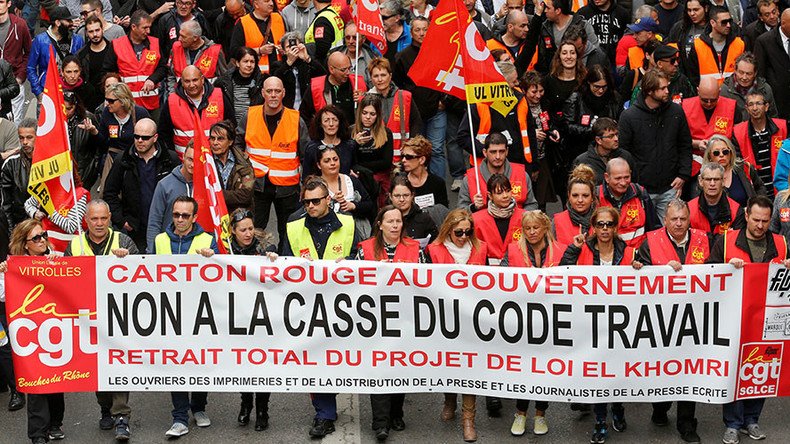French govt pushes ‘progressive’ labor bill through parliament without vote for 3rd time

The French PM has again used exceptional constitutional measures to push through a third reading of a controversial labor reform bill which sparked months of protests across France. The bill will be adopted unless the lower house files a no-confidence motion.
Failing to garner enough support for the labor reform bill on Wednesday, Prime Minister Manuel Valls resorted to so-called Article 49.3. This is the third time he has used the special clause in the constitution which allows laws to be approved without parliamentary vote.
According to France 24, Valls described the bill as a “progressive” text that was “necessary for the future of the country” as he spoke before the parliament.
The labor reform bill has been under parliament’s revision since February and has previously undergone two readings and pushed through without a vote twice.
The only thing that could thwart the law’s adoption now is a no-confidence vote which the National Assembly would have to stage within 24 hours. Unless it does so, the law is considered to have been passed.
French president Francois Hollande and minister Valls who say that the labor reform would boost the country’s economy and decrease unemployment have been facing strong criticism from student groups and trader unions. France was engulfed in mass protests for months with opponents insisting that the reforms would infringe on workers’ rights as it would allow employers to sack workers more easily and would extend working hours.
READ MORE: Hollande threatens to ban demos as French anti-labor law protests grow
The previous use of Article 49.3, to impose labor reform by decree, received accusations from the public who are wary that the government is compromising democracy.
Hoping to garner support for the bill’s approval, France’s Socialist government has repeatedly watered down on the law’s original version. However, the concessions only angered right-wing MPs.
“This bill is, and will forever remain, stained by its antidemocratic character,” the Force Ouvrière (FO) union said in a statement on Wednesday, France 24 reported.
Fresh protests in #France as govt bypasses parliament again to push through #labor law https://t.co/LeHU9LfYuepic.twitter.com/PGIa01L0FY
— RT (@RT_com) July 5, 2016
Opponents of the legislation, who failed twice by just two votes to scrap the law promised to collect 60 signatures from MPs and appeal to France’s Constitutional Council.
The final debate on the law should have been scheduled for a later time “for democratic reasons” given the “context linked to terror attacks and the debate going on in parliament on prolonging the state of emergency,” leftist union FO, said according to the Telegraph. In the wake of the gruesome terrorist attack in Nice which left 84 people dead last week, the National Assembly voted to extend the ongoing state of emergency in France for another six months.
READ MORE: French national assembly votes to extend state of emergency for another 6 months
France has been rocked by anti-labor reform protests for four months. The rallies, which kicked off in March under the slogans LoiTravail (Labor Law) and NuitDebout (Rise Up At Night), have repeatedly turned violent, frequently ending in arrests and injuries.
The controversial bill technically maintains the 35-hour work week, but says that in case of “exceptional circumstances,” employees can be asked to work up to 60 hours a week. It also eases layoffs and weakens some powers of the unions.
No protests have taken place immediately after the parliamentary move on Wednesday, while unions earlier promised to launch another series of strikes on September 15.












